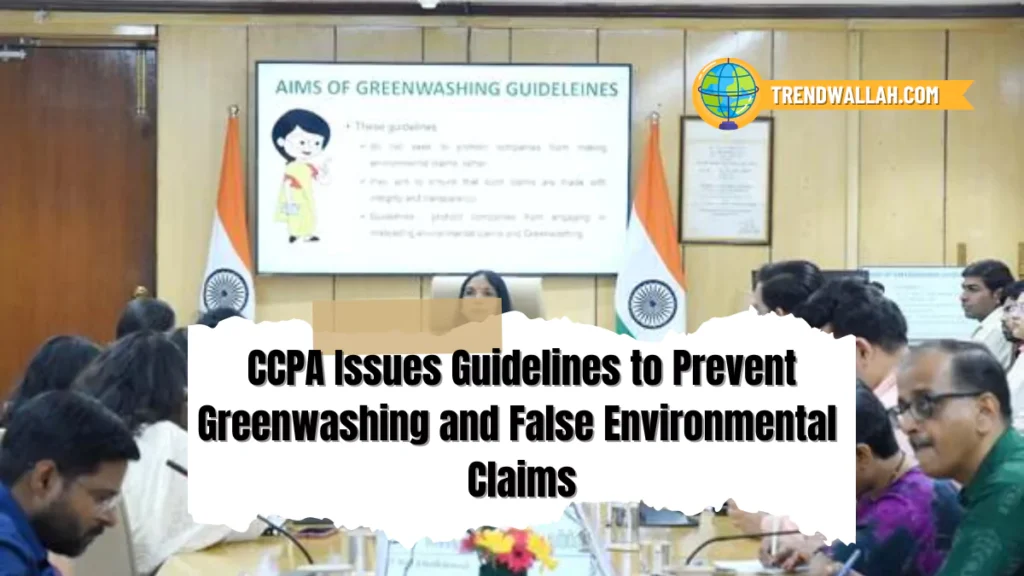
New Guidelines to Stop Greenwashing Introduced by CCPA
The Central Consumer Protection Authority (CCPA) in India has unveiled new guidelines to prevent greenwashing, aiming to curb misleading environmental claims by companies. These guidelines require businesses to provide reliable evidence for any environmental statements they make, ensuring transparency and protecting consumers from deceptive marketing tactics.
Understanding Greenwashing
Greenwashing refers to the act of making false or exaggerated claims about how eco-friendly a product or service is. Companies might use words like “sustainable,” “eco-friendly,” or “green” without proper evidence, creating a misleading impression to attract environmentally conscious consumers. This practice not only misleads buyers but also damages trust in genuine sustainable efforts.
Purpose of CCPA’s Greenwashing Guidelines
The CCPA’s guidelines seek to foster truthful and responsible practices by mandating companies to back their environmental claims with credible certifications or scientific evidence. By doing so, the CCPA hopes to encourage sustainable business practices and improve consumer trust in eco-friendly products.
Key Elements of the Guidelines
- Clear Definitions: The guidelines provide precise definitions of terms like greenwashing and environmental claims to create a common understanding.
- Transparency Requirements: Companies must use credible evidence to support environmental claims, including third-party certifications.
- Prohibition of Misleading Terms: Words like “natural,” “organic,” or “pure” cannot be used without proper qualification and evidence.
- Adequate Disclosures: Businesses must clearly disclose essential details related to their environmental claims, such as the aspect (product, process, or packaging) being addressed.
Key Points of CCPA Greenwashing Guidelines
| Aspect | Details |
| Guideline Release | Central Consumer Protection Authority (CCPA) |
| Purpose | To prevent greenwashing and ensure truthful environmental advertising |
| Key Terms | Greenwashing, Environmental Claims, Transparency Requirements |
| Evidence Required | Credible certification, scientific proof, third-party verification |
| Prohibited Practices | Misleading terms like “eco-friendly,” “sustainable,” without evidence |
| Objective | To protect consumers and promote sustainable business practices |
Central Consumer Protection Authority Issues Guidelines for ‘Prevention and Regulation of Greenwashing and Misleading Environmental Claims’
— PIB India (@PIB_India) October 15, 2024
Guidelines prohibits companies from engaging in Misleading Environmental Claims and Greenwashing
Read here: https://t.co/kLgiDtx1eh pic.twitter.com/b3ZAxoi9nf
Guidelines to Prevent Greenwashing and False Environmental- Summary:
- The CCPA has released guidelines to address greenwashing, aiming to prevent companies from making misleading environmental claims.
- Businesses must provide credible proof for any environmental statement they make.
- Companies cannot use vague terms like “natural” or “eco-friendly” without proper disclosure and evidence.
- The guidelines focus on promoting transparency and sustainability in advertising.
- Greenwashing is a deceptive practice where businesses falsely exaggerate their environmental benefits to attract customers.
Also Read Latest Current Affairs 2024
Greenwashing is when companies make false environmental claims to appear eco-friendly. It misleads consumers and harms genuine sustainable practices.
The guidelines require companies to provide credible evidence for environmental claims and prevent the use of misleading terms without proper proof.
Businesses should back up their environmental claims with reliable data, third-party certifications, and clear disclosures to avoid misleading consumers.
Using terms like “natural,” “eco-friendly,” or “green” without scientific proof or credible certification can be considered misleading.
The CCPA’s guidelines focus on ensuring transparency, and businesses failing to comply may face legal actions for misleading advertising.
The guidelines protect consumers by ensuring they get accurate information about the environmental impact of products, fostering trust in eco-friendly goods.
Yes, many countries, including the United States, Canada, and European nations, have regulations to curb false environmental advertising.
